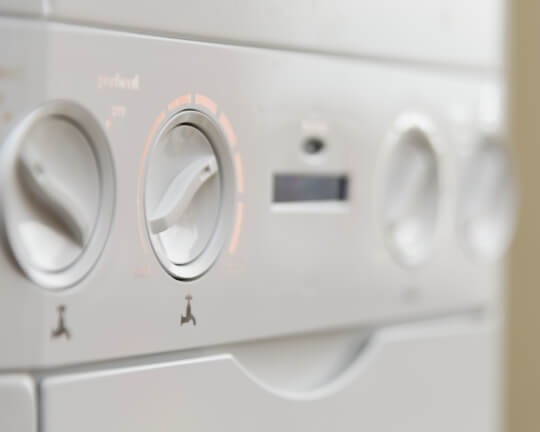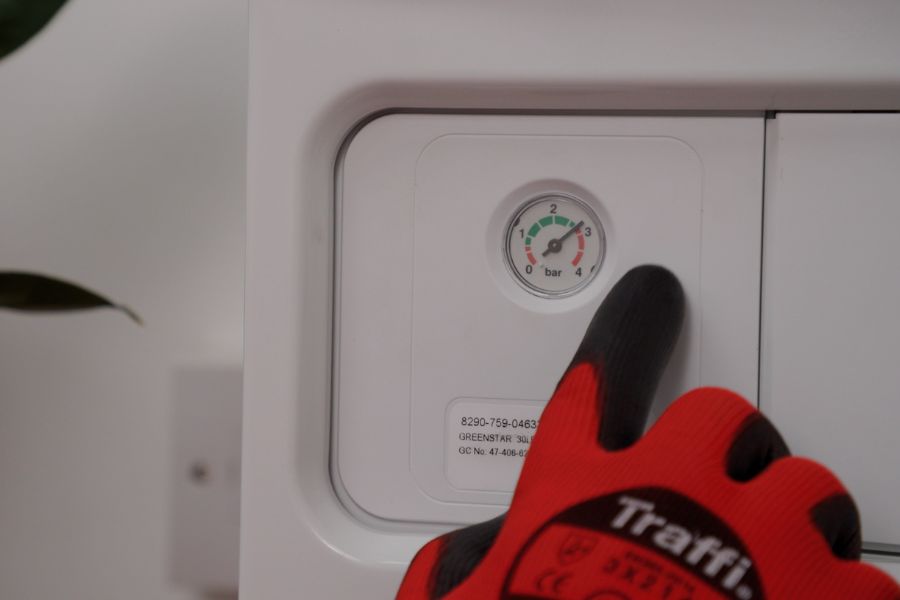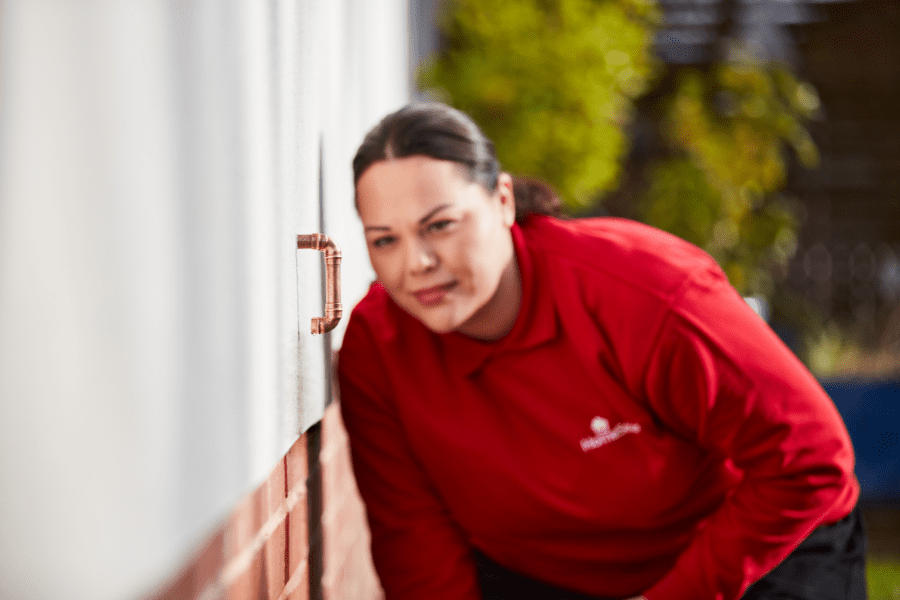Boiler how-to
Why is my boiler leaking water? Common causes
14 Jul 2025 • 7 minutes


If you’re reading this, chances are that you have a leaking boiler. The cause could be down to several different factors, which we’ll walk you through in more detail in this guide.
But before finding out the cause of the leak, to prevent any more water from leaking, you should take the following steps:
Start by checking around your boiler to see exactly where the water is coming from—look for any drips, pooling water, or damp areas.
Then, take a look at the pressure gauge. If it’s reading too high (typically above 2.5 bar), the pressure relief valve (PRV) could be releasing water/excess pressure to prevent damage.
This is a safety feature, but if it’s leaking constantly, it could be a sign that the valve is faulty or the system is over-pressurised.
Never attempt to repair the fault yourself—you could endanger yourself and the other members of your household. Always contact a Gas Safe registered engineer to do repair work on your boiler and any other gas appliances.
When you contact an engineer, it’s helpful to share what you’ve noticed so far, like where the leak is coming from and any other signs or symptoms.
There are several reasons why you’ve spotted your boiler dripping water, and you can work out what’s going on by pinpointing the exact source of the droplets.
If your boiler is dripping water from the bottom, it could be a sign that the pipes inside your boiler have corroded. This could be a distinct possibility if your boiler is old; it’s caused by the oxygen in the water reacting with the metal of the pipes, which creates oxides or rust. The structure of a corroded pipe or tank can start to weaken over time, which could result in water leaking.
Call your Gas Safe registered engineer immediately; they are likely to respond quickly to calls where you’ve told them water is coming out of the boiler. If the corrosion is contained in a single pipe or valve and hasn’t spread to other parts of your boiler, you might be able to get just that isolated part of the boiler replaced. If it’s more widespread, unfortunately, it’s likely cheaper to scrap your boiler and buy a new one.
When you call out your Gas Safe registered engineer, they will be able to open up the boiler, assess the situation and give you some clear advice on what to do.

If your boiler’s pressure relief valve is leaking, it’s most likely that your boiler’s pressure is too high and needs to be lowered. This is a simple but common issue.
Your boiler’s pressure gauge (the dial underneath it that looks like a speedometer) should be somewhere between 1 and 2 bar. If the pressure rises to 3 bar, your boiler’s relief valve may start leaking water in an effort to avoid your boiler rupturing.
Thankfully, this is one of the boiler problems you can fix yourself. To lower your boiler pressure:
If your gas boiler has recently been installed and is leaking water around the pipe fittings, it could be a sign of an installation fault. Don’t worry, this doesn’t necessarily mean the gas engineer you hired did a poor job.
Small water leaks are common in new boiler installations and are often hard to spot during the actual installation. This is why many Gas Safe registered engineers return a few days later to check everything’s working correctly.
If you’re having this problem, call your engineer to return to your home and fix the leak. In the unlikely event that you previously hired an unregistered engineer to install your boiler, call a Gas Safe registered engineer and get them to come and fix the leak.
Over time, the joints and seals in your boiler can wear out or become loose, especially with constant heating and cooling.
This is a common cause of leaks and is usually one of the easier issues to fix. In many cases, it’s simply a matter of tightening a fitting or replacing a worn-out seal. A qualified Gas Safe engineer will be able to quickly identify the problem and carry out the necessary repair to stop the leak.
The heat exchanger is a key part of your boiler, responsible for heating the water. If it develops a crack or fault, it can start to leak.
Unfortunately, this isn’t always a quick fix, as a damaged heat exchanger may need to be replaced, which could be a costly repair.
If you suspect this might be the issue, it’s best to get a professional engineer to assess the damage and advise on the best next steps.

The PRV is an important safety feature in your boiler. It’s designed to release excess pressure if the system gets too high, typically above 3 bars, helping to prevent damage. It can also release water if the boiler overheats, keeping both pressure and temperature in check.
However, if the PRV develops a fault, it may not function properly. It might fail to release pressure when needed, or it could start leaking even if the system pressure is within a normal range. This often happens due to worn seals or a buildup of limescale inside the valve.
If you suspect an issue with the PRV and you’ve tried to lower the pressure (which hasn’t worked, or it keeps happening), it’s best not to try and fix it yourself.
We recommend getting a Gas Safe registered engineer to inspect the boiler. They’ll be able to safely diagnose the problem and carry out any necessary repairs to get your system back in working order.
Your boiler’s condensate pipe is responsible for carrying away condensation produced during operation. If this pipe becomes blocked (often due to debris or freezing), the water may not drain properly and may back up into the boiler, causing a leak. This is especially common in colder months when the pipe can freeze.
If you suspect the condensate pipe is blocked due to debris, avoid trying to force it clear yourself.
Instead, switch off your boiler as a precaution and contact a Gas Safe registered engineer. They can safely unblock or replace the pipe if needed and help prevent the issue from happening again in the future.
If the pipe is frozen and easily accessible from outside your home, you could try thawing the condensate pipe using a hot water bottle.
No. If you find or suspect a leak, or you see that the boiler pressure has dropped significantly in a short space of time, it’s probably a leak. Stop using your boiler, switch off your water supply at the mains along with the central heating, and contact a Gas Safe registered engineer.
The best way to prevent your boiler from leaking water is by arranging an annual boiler service. This keeps your system in optimum health all year round—any minor issues can be dealt with by a trained professional before they turn into anything more significant. This means you can potentially avoid any serious problems for the life of your boiler.
A powerflush is a way of flushing your heating system with a cleansing chemical, removing any built-up limescale and debris. This could help to reduce the risk of corrosion.
A longer-term solution is to get a magnetic filter installed in your central heating system. The magnetic filter removes debris from your entire system before it has a chance to build up and affect your boiler.
Regularly check your boiler’s pressure gauge. If the pressure is too high or keeps fluctuating, it could lead to leaks. Aim to keep it between 1 and 2 bars, and contact an engineer if anything seems off.
No. You will need to call a Gas Safe registered engineer straight away if you see water leaking from your boiler, it could be a sign of a major fault that could cost you a new boiler.
The exception is if your pressure relief valve is leaking because there’s too much pressure, you can lower the pressure yourself.
If your boiler is dripping water from the bottom, it could be a sign that the pipes inside your boiler have corroded. This could be a distinct possibility if your boiler is old, so call a Gas Safe registered engineer immediately.
A leaking boiler isn't something you should attempt to fix yourself, so you'll want a Gas Safe registered heating engineer round sooner rather than later.
With Ding, you’ll have access to our trusted heating engineers when something goes wrong. No calling around or messing about, just upfront pricing and availability so you can make the best decision about your home repair.
Our help & advice articles cover Plumbing, Home heating, Electrical, Energy-saving and Home maintenance.